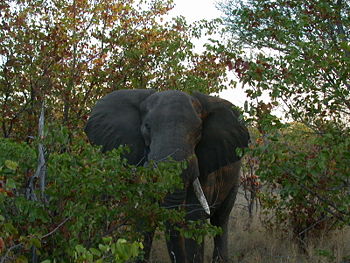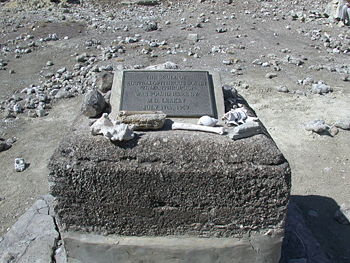User:Matt Sponheimer: Difference between revisions
imported>Matt Sponheimer No edit summary |
imported>Matt Sponheimer No edit summary |
||
| Line 1: | Line 1: | ||
[[Image:Ellie.JPG|right|thumb|350px|{{#ifexist:Template:Ellie.JPG/credit|{{Ellie.JPG/credit}}<br/>|}}Elephant in the Kruger National Park, South Africa.]] | [[Image:Ellie.JPG|right|thumb|350px|{{#ifexist:Template:Ellie.JPG/credit|{{Ellie.JPG/credit}}<br/>|}}Elephant in the Kruger National Park, South Africa.]] | ||
[[Image:Zinjplace.JPG|right|thumb|350px|{{#ifexist:Template:Zinjplace.JPG/credit|{{Zinjplace.JPG/credit}}<br/>|}}Plaque commemorating the discovery of ''Zinjanthropus boisei''.]] | [[Image:Zinjplace.JPG|right|thumb|350px|{{#ifexist:Template:Zinjplace.JPG/credit|{{Zinjplace.JPG/credit}}<br/>|}}Plaque commemorating the discovery of ''Zinjanthropus boisei''.]] | ||
Sponheimer’s research focuses on the ecology of early human ancestors in Africa. He is currently director of a multi-disciplinary project investigating the community paleoecology of Australopithecus africanus at Makapansgat Limeworks, South Africa, and co-director of a research group examining the neoecology of large mammals in South Africa’s Kruger National Park. He is also co-director of two projects using heavy isotopes to study early hominin land use at Olduvai Gorge, Tanzania and the Sterkfontein Valley, South Africa. | Sponheimer’s research focuses on the ecology of early human ancestors in Africa. He is currently director of a multi-disciplinary project investigating the community paleoecology of ''Australopithecus africanus'' at Makapansgat Limeworks, South Africa, and co-director of a research group examining the neoecology of large mammals in South Africa’s Kruger National Park. He is also co-director of two projects using heavy isotopes to study early hominin land use at Olduvai Gorge, Tanzania and the Sterkfontein Valley, South Africa. | ||
[http://www.colorado.edu/anthropology/sponheimer www.colorado.edu/anthropology/sponheimer] | [http://www.colorado.edu/anthropology/sponheimer www.colorado.edu/anthropology/sponheimer] | ||
Revision as of 17:35, 18 February 2008
Sponheimer’s research focuses on the ecology of early human ancestors in Africa. He is currently director of a multi-disciplinary project investigating the community paleoecology of Australopithecus africanus at Makapansgat Limeworks, South Africa, and co-director of a research group examining the neoecology of large mammals in South Africa’s Kruger National Park. He is also co-director of two projects using heavy isotopes to study early hominin land use at Olduvai Gorge, Tanzania and the Sterkfontein Valley, South Africa.
www.colorado.edu/anthropology/sponheimer
A few of my publications...
Sponheimer, M. & Lee-Thorp, J. (2007). Hominin Palaeodiets: The Contribution of Stable Isotopes. In Handbook of Paleoanthropology. Springer-Verlag, Berlin, pp. 555-586.
Sponheimer, M., Passey, B., de Ruiter, D., Guatelli-Sternberg, D. Cerling, T. & Lee-Thorp, J. (2006). Isotopic Evidence for Dietary Flexibility in the Early Hominin Paranthropus robustus. Science 314, 980-982.
Sponheimer, M., Loudon, J.E., Codron, D., Howells, M.E., Pruetz, J.D. , Codron, J., de Ruiter, D. & Lee-Thorp, J.A. (2006). Do “Savanna” Chimpanzees Consume C4 resources? Journal of Human Evolution 51, 128-133.
Sponheimer, M., Lee-Thorp, J., DeRuiter, D, Smith, J., van der Merwe, N., Reed, K., Ayliffe, L., Heidelberger, C. & Marcus, W. (2003). Diets of Southern African Bovidae: The Stable Isotope Evidence. Journal of Mammalogy 84, 471-479.
Sponheimer, M., Robinson, T., Ayliffe, L., Roeder, B., Hammer, J., West, A., Passey, B., Cerling, T., Dearing, D. & Ehleringer, J. (2003). Nitrogen Isotopes in Mammalian Herbivores: Hair d15N Values from a Controlled-Feeding Study. International Journal of Osteoarchaeology 13, 80-87.
Class Stuff
If you are in ANTH 4110/5110, you can find the class Citizendium/Eduzendium page here [1]

